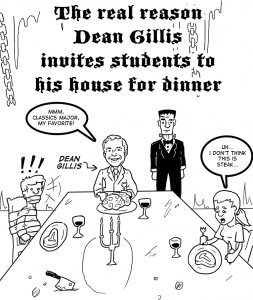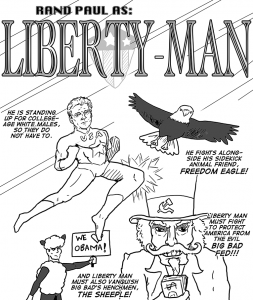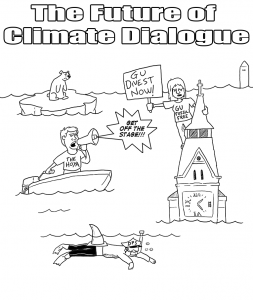Elizabeth, shivering, hugs her arms to her chest and watches fog. Between the tops of the pine trees, dark and certain in their somber solitude like so many church steeples, it drapes gossamer-light like a silk shawl. She fingers the cuff of her sweater, a thin polyester thing with ugly buttons that remind her of olives, purchased at the last minute because nothing she had was decent and black and she had expected the weather to be cold, though not this cold; she forgot how cold Boston could be in April. She revels in the feel of the cheap fabric against her skin, with the damp seeping in through the sleeves and her arms goosebumped underneath.
This is a sensation she can hold onto, and so hold she does, untangling its strands backward in time to find the memory of a plaid blanket and a cup of cocoa by a fire and snowdrifts bowed against the windowpanes. In her recollection the contrast is heightened, the cold colder than it really was and the warmth warmer, but after all the memory isn’t really about blankets and snow, it’s about an idea of comfort that comes with childhood and winter and being loved.
She pushes at the memory a little, expanding it from just a feeling into a portrait of a room she recognizes. There is the red loveseat with the mismatched pillows that smelled like cedar where she read Jane Eyre in the evenings. There, the lamp with the shade that never hung straight and looked like the hats Chinese men wore in the pictures. There, the throw rug with the funny animals on it, a cross between a bird and a giraffe they seemed—how she used to make up stories about them in her head! And there, topping off the scene with a flourish of holiday cheer, a lighted tree in one corner.
As a girl Elizabeth always thought that there was nothing better than Christmas in New England. On the night train up from Washington, with Ann curled asleep into a round knot on the seat beside her, little Elizabeth watched the towns twinkle past like places from a storybook, the houses with eaves bearded in a fringe of icicles and all aglow inside behind windows that flung patches of weak gold onto the dark snow.
In the harbors along the Connecticut shore, the fishing boats slumbered quietly at their moorings, dreaming—so Elizabeth once imagined—of the feel of open ocean beneath their hulls, the endless porcelain bowl of the horizon falling away in front of them, and the day when they too would inherit the sea. All fishing boats must have dreams like that, Elizabeth thought. If she were a boat with nothing to do all day but ferry great buckets of slimy fish in and out of the harbor, she would surely cherish dreams of adventure among the toss of the waves.
And the train, rumbling, eased down the tracks toward Boston.
Then there was the collecting, the gathering, the getting off at North Station with the dim underground pulse of the rails still beating in her chest. Snow flurried against the windshield of the cab as they slid past Faneuil Hall on muffled wheels.
It was a relief to finally tumble out of the taxi with Ann, coats tightened up to their armpits against the bite of the frozen air, in front of a house that never seemed to change from one Christmas to the next. When the front door opened to let them in, they hurried toward it up the icy steps with breath smoky in the porchlight.
But when Elizabeth, remembering, tries to summon the face that waited on the other side of that door—and this one face is all that is needed to complete the scene—it is too much. The memory bursts like a soap bubble stretched too far from its point of contact, leaving Elizabeth again with only trees, fog, and the plain wooden box on the dewed grass.
After the funeral, Elizabeth is directed toward the car of a woman she is told is a relation of hers, a second cousin once-removed who tells Elizabeth to please get in the back and mind the cake on the floorboard. Elizabeth does as she is told, and for the sake of making conversation asks what kind of cake it is. It is a pineapple upside-down cake, and after Elizabeth has learned this fact, there is nothing more for her to say about it. She has never eaten pineapple upside-down cake before and cannot imagine how a cake could stand on its head, and the large white box in which it is enclosed gives no hint of its geometry. A faintly sweet smell emanates from the box and makes Elizabeth, who has had nothing to eat or drink all day except a cup of complimentary coffee at the motel, begin to feel queasy.
When they are moving, she feels better. She leans her forehead against the slick, cool windowpane and listens to the crunch of the car wheels on the gravel road of the cemetery. Row upon row of tombstones march away into the distance across the hilly green grass until they are lost in the fog, and Elizabeth squints to make out the dates on some of the nearer ones as they pass. Eighteen-ninety. Nineteen-twelve. Eighteen-eighty-seven. The thought of all these human bodies slowly melting back into the dirt over the course of a century fills her with a curious sense of proportion. One day her grandmother, too, will be as much as part of the landscape as the pine trees.
They leave the cemetery and wind their way down quiet streets of brick houses. In the backyard of one, Elizabeth spies a tire swing hanging from the branch of a tall poplar and wonders at the little boy or girl who must have played on it on summer days.
“Were you close to her?” the second cousin once-removed asks suddenly, breaking the silence in the car. Elizabeth can see her eyes watching her in the rearview mirror.
“I used to go to her house every Christmas when I was a kid,” she answers.
“I’m sorry,” the woman says, shaking her head.
“Did you know her very well?” Elizabeth asks, wondering what depth of personal feeling has occasioned the pineapple upside-down cake.
“I visited her every weekend in the nursing home, towards the end. She was my mother’s cousin, and my mother always spoke very warmly of her. I’m sorry I didn’t get to know her better before…while she still had all her mental faculties. She must have been a very interesting woman.”
The car slows and turns into the unfamiliar driveway of a squat, white-shingled house fronted by a perimeter of neatly clipped boxwood hedge.
“She was,” Elizabeth says. “She was always full of stories. She’d tell us about growing up in Lebanon in the twenties, in Beirut, when it was controlled by the French. We loved her stories.”
The woman turns off the car and they both get out, Elizabeth in heels trying not to trip over the folds of her skirt as she does so.
“Bring the cake with you, if you wouldn’t mind,” the woman says.
Clutching the cake box under one arm and her purse under the other, Elizabeth climbs the steps to the front door behind her. Inside, a dozen or so people are already gathered around the coffee table in the living room, balancing plastic plates of hors d’oeuvres and glasses of seltzer on the furniture and talking in hushed voices. She recognizes several cousins she hasn’t seen for years and her mother’s oldest brother John, who is standing by himself and staring out the window with his hands in his pockets.
Elizabeth deposits the cake in the kitchen and comes back to the gathering with a glass of ice water. Her uncle John is still planted next to the window, and it occurs to Elizabeth that she ought to go talk to him. He has lost his mother, after all, and that must be harder than losing a grandmother. She ought to walk over to him now, offer him the distant, respectful condolences that are required when someone else’s loss is so much greater than one’s own.
But when she pictures herself doing it, the gesture feels false. She should have conveyed her respects with a gift instead, something that would demonstrate her sympathy while appropriately acknowledging the difference between herself and the truly bereaved. Why didn’t it occur to her to buy flowers at least, or a bottle of wine? Or would wine have been too festive? She envies the foresight of her second cousin.
A man Elizabeth doesn’t know approaches Uncle John, and to her relief, they strike up a conversation. She sips her ice water and wishes she were somewhere else. The catered food on the table looks wilted and unappetizing, but she tries a stuffed mushroom anyway and is surprised to discover how hungry she is. She fixes herself a plate and looks around for a place to sit. All the seats on the couch are taken and her feet are begging for a rest, so she takes her food and heads back to the kitchen in the hopes of finding a chair there.
The kitchen has been commandeered by the caterers since she was last there, and she is out of place amid the young women in their smart white aprons who are busily ferrying platters of veggies and dip and mini quiches in and out of the room. She steals a quiche when no one is watching and stands at the sink furtively cramming it into her mouth while pretending to admire the view out the window.
After the caterers make it clear that she is getting in their way, she heads for the back door, which opens onto a spacious backyard. Elizabeth can make out a picnic bench beneath a budding cherry tree and a rusted swing set partly overgrown with creeping myrtle.
Braving the cold, Elizabeth slips outside and picks her way across patches of mud and clover and sits down in one of the swings. It creaks beneath her in a friendly sort of way, as if happy to bear the weight of human troubles again. Elizabeth wonders how many other people this swing has comforted before her. She imagines she can see them now, a circle of ghosts extending their spectral arms toward her in solidarity and understanding.
The murmur of voices inside the house is hushed by the rustle of leaves above her head. When she closes her eyes, the sound reminds her of many tiny wings rubbing together. She rocks gently back and forth, leaning her face into the damp caress of the air and breathing in the smell of new earth and of all the green things growing inside it.




